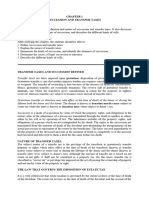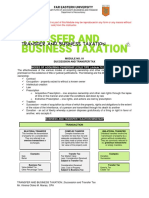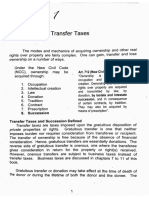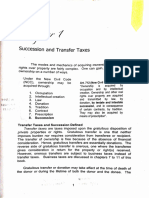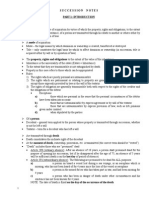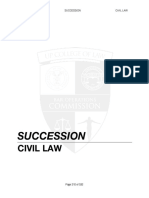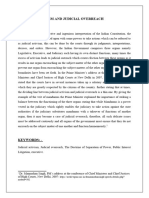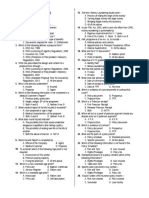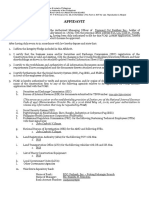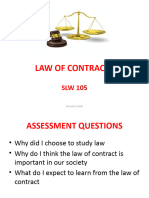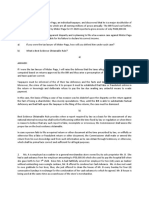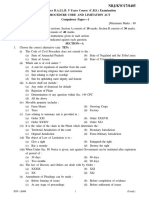bustax-tabag-chap-1
Uploaded by
nicauliflower04bustax-tabag-chap-1
Uploaded by
nicauliflower04SUCCESSION AND TRANSFER TAXES
The modes and mechanics of acquiring ownership and other real rights over property are fairly complex.
One can gain, transfer and lose ownership on a number of ways.
Under the Civil Code (CC), ownership may be acquired through:
1. Occupation
2. Intellectual creation
3. Law
4. Donation
5. Tradition
6. Contract
7. Prescription
8. Succession
Art. 712 (Civil Code): “Ownership is acquired by occupation and by intellectual creation. Ownership and other real
rights over property are acquired and transmitted by law, by donation, by testate and intestate succession, and in
consequence of certain contracts, by tradition. They may also be acquired by means of prescription”.
Transfer Defined
Transfer taxes are taxes imposed upon the gratuitous disposition of private properties or rights. Gratuitous
transfer is one that neither imposes burden nor requires consideration from transferee or recipient. The transfer of
ownership is free because of the absence of financial consideration. Hence, gratuitous transfers are essentially
donations. The reverse side of gratuitous transfer is onerous, one where the transferee gives consideration in
return for the property or right(s) received. However, onerous transfers are subject to business taxes instead of
transfer taxes.
Types of Transfer Taxes
1. Estate tax
2. Donor's tax
Gratuitous transfer or donation may take effect at the time of death of the donor or during the lifetime of
both the donor and the donee. The former is known as “donation mortis causa” subject to estate tax while the
latter is known as “donation inter vivos” subject to donor’s tax. Consequently, transfer taxes, which are typically
assessed on the net value,of the taxable assets transferred, fall into two basic categories, namely, estate tax and
donor’s tax. Estate tax is discussed in Chapters 1 to 5 of this book while donor’s tax is discussed in Chapter 6.
Succession Defined
Since donation mortis causa takes effect upon the death,of a decedent, it is appropriate to discuss first the
concept of Succession. Succession is a mode of acquisition by virtue of which, the property, rights and obligations
to the extent of the value of the inheritance, of a person are transmitted through his death to another or others
either by his will or by operation of law (Art.774 CC). The inheritance includes all the property, rights and
obligations of a person which are not extinguished by his death (Art. 775CC). The rights to the succession are
transmitted from the moment of death of the decedent (Art. 777 CC), notwithstanding the postponement of the
actual possession,or enjoyment of the estate by the beneficiary. The “heirs succeed immediately to all the property
of the deceased ancestor at the moment of death as completely as if the ancestor had executed and delivered to
them a deed for the same before his death.
* The amount of obligation acquired/inherited by an heir should not be more than the combined value of
the properties and rights inherited.
Nature of transfer taxes
Transfer tax is an excise tax. The subject matter of a transfer tax is the privilege of the transferor to
gratuitously transfer property or rights which takes effect at the date of death of the transferor (known as transfer
mortis causa subject to estate tax) or during the lifetime of the donor and the donee (known as transfer inter vivos
subject to donor’s tax). Although the amount of transfer tax is based on net estate or net gifts, it shall not be
construed as a property tax. On this basis, transfer tax is classified as “excise tax” or privilege tax imposed on the
act of passing the ownership of property and not on the value of the property or right.
The Law that Governs the Imposition of Estate Tax
It is a well settled rule that estate taxation is governed by the statute in force at the time of death of the
decedent. The estate tax accrues as the date of death of the decedent and the accrual of the tax is distinct from
the obligation to pay the same. Upon the death of the decedent, succession takes place and the right of the State
to the tax the privilege to transmit the estate vests instantly upon death (Section 3, RR 2-2003). In the Philippines,
succession itself (excluding the tax aspect) is governed by the Civil Code.
Kinds of Succession (Art. 778 CC):
Whenever a person dies leaving property (inheritance), a question normally arises as to how his
property,or estate will be dealt with by those s/he left behind. The answer depends,on whether or not a decedent
left a “will” at the time of his death. The definition of “succession” as discussed in page 2, clearly,states that the
inheritance is transmitted either through last will and testament or by operations of law (in the absence of a last
will and testament, the provisions of the Civil Code on Succession shall apply).
A person is normally said to have died testate if he left a will (refer to the definition of a “will” in Page 13)
at the time of his/her death and a person is said to have died intestate if such a person died without leaving a,will.
To summarize, succession may be classified as:
1. Testamentary or testate succession. A type of succession that results from the designation of an heir,
made in a will executed in the form prescribed by law.
2. Legal or intestate succession. A type of succession which is effected by operations of law (based on the
provisions of the civil code pertaining to succession) since the decedent did not execute a will or if the last
will and testament executed by him is void.
3. Mixed succession. A type of succession which is effected partly by “will” and partly by operation of law.
CAUSES OF LEGAL SUCCESSION OR INTESTACY:
1. If a person dies without a will, or with a void will, or one which has subsequently lost its validity.
2. When the “Will” does not institute an heir.
3. Partial institution of heir. Consequently, intestacy takes place as to the undisposed portion. It means
the entire estate was not disposed of in the last will and testament. Therefore, a mixed succession exists.
Part of the estate will be disposed of or distributed to the heirs based on,the last will and testament.
Nonetheless, since there are properties in the estate that were not included in the will, such properties
shall be disposed of in accordance with law (only as to the undisposed portion or as to the portion of the
estate not mentioned in the will).
4. Other causes of legal succession or intestacy:
1. When the heir instituted is not capable of succeeding
2. Non-fulfillment of the suspensive condition attached to the institution of heir. Suspensive condition
is a condition depending upon the happening of an uncertain event which must be fulfilled before
an obligation arises.
3. Preterition (omission in the testator’s will of one, some or all of the compulsory heirs in the direct
line which has the effect of annulling the institution of heir).
4. Fulfillment of “resolutory condition”. A resolutory condition refers to a condition whereby, upon
fulfillment terminates an already enforceable obligation.
5. Expiration of term or period of institution.
6. Non-compliance or impossibility of compliance with the will.
7. Repudiation of the instituted heir.
Elements of Succession:
1. Decedent is the general term applied to the person whose property is transmitted through succession, whether
or not he left a will. If he left a will, he is called a testator (Art. 775 CC).
2. Executor is,a. persondesignated in the last will and testament to carry out the provisions of the decedent’s will.
He also performs a fiduciary duty such as taking care of the decedent’s estate prior to final disposition to the
heirs. Administrator is a person appointed by the court and performs the same duty, in lieu of an executor, if the
latter refused to accept the appointment, failed to qualify under the law or the last will and testament did not
appoint one.
3. Inheritance (Estate) - Include all the property, rights and obligations of a person which are not extinguished
by death and all which have accrued thereto since the opening of succession. Rights which are purely personal are
not transmissible for they are extinguished by death (Art. 776 CC).
4. Successor - An heir or successor is a person who is called to the succession either the provision of a will or by
operation of law (Art. 781CC). Devisees and legatees are persons to whom gifts of real and personal property are
respectively given by virtue of a will. Successors or heirs are classified under the law as follows:
a) COMPULSORY HEIRS – those who succeed by force of law to some portion of the inheritance, in an
amount predetermined by law, known as the legitime. They succeed whether the testator likes it or not.
They cannot be deprived by the testator of their legitime except by disinheritance properly effected.
Kinds of compulsory heirs:
Primary – those who have precedence over and exclude other compulsory heirs (i.e., legitimate children and
descendants).
Secondary those who succeed only in the absence of the primary compulsory heirs; (i.e., legitimate parents
and ascendants).
Concurring – those who succeed together with the primary or secondary compulsory heirs (i.e., illegitimate
children and descendants and surviving spouse).
TABLE 1-1 COMPULSORY HEIRS
Primary Compulsory Secondary Compulsory
A. Legitimate children and their legitimate D. Legitimate parents and legitimate ascendants. (They
descendants. inherit only in default of “A”)
E .Illegitimate parents (no other descendants). They inherit
B. Surviving spouse
only in default of “A” & “C”.
C. Illegitimate children and their descendants,
legitimate or illegitimate
NOTE: Brothers and sisters are neither compulsory heirs nor strangers. However, they may be voluntary heirs.
b. VOLUNTARY HEIRS – those instituted by the testator in his will to succeed to the inheritance of the portion
thereof of which the testator can,freely dispose. Free portion refers to the portion or value left in the estate after
deducting the legitime of the compulsory heirs. The share of a voluntary heir,is determined through the last will
and testament.
c. LEGAL OR INTESTATE HEIRS – those who succeed to the estate of the decedent by operation of law (decedent
died without a valid will or his estate was not entirely disposed of by will)
COMPOSITION OF GROSS ESTATE:
The gross estate is divided into two main categories for succession purposes, the legitime and free portion as
shown below:
Decedent’s Estate To be inherited by:
Compulsory Heirs: This portion of the estate is reserved by law specifically to
LEGITIME (i.e., 75% of
compulsory heirs, regardless of whether a last will and testament was prepared (Refer
the estate)
to Table 1-3_Table of Legitimes).
Compulsory Heirs and/or Voluntary Heirs. * As provided in the last will and
FREE PORTION (i.e.,
testament. * In the absence of a will, this portion of the estate shall be distributed to
25% of the estate)
“intestate heirs” based in the order of priority as provided in Table 1-2.
LEGITIME is part of a testator’s property which he cannot dispose of because the law has reserved it for certain
heirs who are, therefore, called *compulsory heirs (Art. 886 CC). The compulsory heirs cannot be deprived of their
legitime by the testator except by disinheritance properly effected. On,the other hand, Free Portion is that
portion of the estate which the testator,can,freely dispose of. Hence, anyone may inherit from free portion
(compulsory or,voluntary heirs). Nonetheless, voluntary heirs may inherit only if mentioned in the will. In the
absence of a provision in the will, voluntary heirs will not inherit anything. In such cases, the free portion shall be
disposed of to intestate heirs based in the order of priority as presented below:
TABLE 1-2: ORDER OF INTESTATE SUCCESSION
1. Legitimate children or descendants
2. Legitimate parents or ascendants
3. Illegitimate children or descendants
4. Surviving spouse
5. Brothers and sisters, nephews and nieces
6. Other collateral relatives within the 5th degree
7. State or the government
The distribution of free portion in intestate succession is based on the order of priority because
in,every,inheritance, the relative nearest in degree excludes the more distant ones, saving the right of
representation when it properly takes place.
Collateral Relatives
Consanguinity,Consanguinity is the relation of persons descending from the same stock or common
ancestors. These persons are known as blood relatives, and are said to be related by blood or consanguinity. It
may be lineal or collateral. Lineal consanguinity, which may be descending or ascending, is that which subsists
between persons of whom one is descended in a direct line from the other. Collateral consanguinity is that
which subsists between persons who have the same ancestors, but who do not descend (or ascend) one from the
other. Proximity of relationship is determined by the number of generations. Each generation forms a degree.
Survivor Legitime Notes
Divide by the number of LC, whether they survive alone or with concurring
LC 1/2
compulsory heir (CH)
1 LC
1/4
SS
2 or more
LC 1/4
SS
All the concurring CH get from the half free portion, the share of the SS having
LC Equal to 1
preference over that of the IC, whose share may suffer reduction pro-rata because
SS LC
there is no preference among themselves
LC
1/2 Whether they survive alone or with concurring CH
IC
SS 1/4 of 1
IC succeed in the 1/4 in equal shares
IC LC
LPA 1/2
LPA
1/4
LC
LPA
1/4
IC
SS 1/4
LPA
1/8
SS
SS
1/4
IC
IC 1/2 Divide equally among the IC
1/3 if marriage is in articulo mortis and deceased spouse dies within 3 months after
SS 1/3
the marriage
IC 1/3
SS 1/2
IP 1/4 Children inherit in the amounts established in the foregoing rules
IP
Excluded
Any child
Only the parents of IC are included. Grandparents and other ascendants are
IP It depends
excluded.
SS 1/4
Key:
LC = Legitimate Children
SS = Surviving Spouse
IC = Illegitimate Children
LPA = Legitimate Parents and Ascendants
IP = Illegitimate Parents
Wills
A will is an act whereby a person is permitted, with the formalities prescribed by law, to control to a certain
degree the disposition of his estate to take effect after his death (Art. 783 CC). It is a document whereby a person,
called the “testator”, disposes,of his or her properties or “estate” to take effect upon his or her death.
The making of a will is a strictly personal act. It cannot be left in whole or in part of the discretion of a third
person, or accomplished through the instrumentality of an agent or attorney. All persons who are not expressly
prohibited by law may make a will. The persons prohibited by law to make a will are those below 18 years old and
those who are not of sound mind at the time of its execution.
The law presumes that every person is of sound mind, in the absence of proof to the contrary. The burden of proof
that the testator was not of sound mind at the time of making his dispositions is on the person who opposes the
probate of the will. If the testator, one month, or less, before making his,will was publicly known to be insane, the
person who maintains the validity of the will must prove that the testator made it during a lucid interval.
Supervening incapacity does,not invalidate an effective will, nor is the will of an incapable validated by the
supervening of capacity. A married woman may make a will without the consent of her,husband, and without the
authority of the court. A married woman may dispose by will of all her separate property as well as her share of the
conjugal partnership or absolute community property.
Kinds of Wills:
1. Notarial or Ordinary or Attested Will – is one which is executed in accordance with the formalities
prescribed by Art. 804 to 808 of the New Civil Code.
Requisites for a Valid Notarial Will
a) It must be in writing and executed in a language or dialect known to the testator.
b) It must be subscribed at the end thereof by the testator himself or by the testator’s name written by
some other person in his presence and by his express direction.
c) It must be attested and subscribed by three or more credible witnesses in the presence of the testator
and of one another.
The following are disqualified from being witnesses to a will (Art. 821 CC):
1. Any person not domiciled in the Philippines.
2. Those who have been convicted of falsification of a document, perjury, or false testimony.
In the absence of bad faith, forgery, or fraud, or undue and improper pressure and influence,
defects and imperfections in the form of attestation or in the language used therein shall not render the
will invalid if it is proved that the will was in fact executed and attested in substantial compliance with all
the requirements of the law.
Art. 795 CC: “The validity of a will as to its form depends upon the observance of the law in force at the
time it is made.”
2.Holographic Will – is a written will which must be entirely written, dated and signed by the hand of the testator
himself. It subject to no other form and it may be made in or out of the Philippines and need not be witnessed (Art.
811 CC). In case of any insertions cancellation, erasure or alteration in a holographic will, the testator must
authenticate the same by his full signature.
Codicil is a supplement or addition to a will, made after the execution of a will and annexed to be taken
as a part thereof, by which any disposition made in the original will is explained, added to or altered. In
order that a codicil may be effective, it shall be executed as in the case of a will (Arts.825 and 826 CC).
Art 815 CC “No property of a testator shall pass to an heir unless proven that all the terms in the last will
and testament is legal and valid in court”.
PROBATE OF A WILL is a court procedure by which a will is proved to be valid or invalid. In the probate of
a holographic will, it shall be necessary that at least one witness who knows the handwriting and signature
of the testator explicitly declare that the will and the signature are in the handwriting of the testator. The
proceedings in the absence of a last will and testament is called “intestate proceedings”.
Foreign Wills
The will of an alien who is abroad produces effect in the Philippines if made with the formalities
prescribed,by the law in the place in which he resides, or according to the formalities observed in his country, or in
conformity with those which the Philippine civil code prescribes. A will made in the Philippines by a citizen or
subject of another country, which is executed in accordance with the law of the country of which he is a citizen or
subject, and which might be proved and allowed by the law of his own country, shall have the same effect as if
executed according to the laws of the Philippines.
When a Filipino is in a foreign country, he is authorized to make a will in any of the forms established by
the law of the country in which he may be. Such will may be probated in the Philippines (Art. 815 CC).
Revocation of wills and testamentary dispositions
A will may be revoked by the testator at any time before his death, any waiver or restriction of this right is
void (Art. 828 CC). A revocation done outside the Philippines, by a person who does not have his domicile in the
Philippines, is,valid when it is done according to the law of the place where the will was made, or according to the
law of the place in which the testator had his domicile at the time and if the revocation takes place the Philippines
when it is in accordance with the provisions of the new civil code.
MODES OF REVOKING A WILL:
1. By implication of law
2. By some will, codicil, or other writing executed as provided in case of wills
3. By burning, tearing, cancelling, or obliterating the will with the intention of revoking it, by the testator himself, or
by some other person in his presence, and by his express direction. If burned, torn, cancelled, or obliterated by
some other person, without the express direction of the testator, the will may still be established, and the estate
distributed in accordance therewith, if its contents, and due execution, and the fact of its unauthorized destruction,
cancellation, or obliteration are established according to the Rules of Court.
Art 837 CC: “If after making a will, the testator makes a second will, expressly revoking the first, the
revocation of the second will does not revive the first will, which can be revived only by another will or
codicil”.
Subsequent wills which do not revoke the previous ones in an express manner, annul only such
dispositions in the prior wills as are inconsistent with or contrary to those contained in the latter wills. A
revocation made in a subsequent will shall take effect, even if the new will should become inoperative by
reason of the incapacity of the heirs, devisees or legatees designated therein, or by their renunciation. A
revocation of a will based on a false cause or an illegal cause is null and void.
Institution of heir (Art. 840 CC)
Institution of an heir is an act by virtue of which a testator designates in his will the person or persons who
are to succeed him in his property and transmissible rights and obligations. A will shall be valid even though it
should not contain an institution of an heir, or such institution should not comprise the entire estate, and even
though the person so instituted should not accept the inheritance or should be incapacitated to succeed. In such
cases the testamentary dispositions made in accordance with law shall be complied with and the remainder of the
estate shall pass to the legal heirs.
A compulsory heir may, in consequence of disinheritance, be deprived of his legitime, for causes expressly
stated by law. Disinheritance can be effected only through a will wherein the legal cause therefore shall be
specified. The burden of proving the truth of the cause for disinheritance shall rest upon the other heirs of the
testator, if the disinherited heir should deny it.
Disinheritance
Disinheritance is a testamentary disposition by which a compulsory heir is deprived of, or excluded from the
inheritance to which he has a right. Disinheritance is not applicable to voluntary heirs.
REQUISITES for Disinheritance:
1. Effected only through a valid will
2. For a cause expressly stated by law
3. Cause must be stated in the will itself
4. Cause must be certain and true
5. Unconditional
6. Total (there is no partial disinheritance)
7. The heir disinherited must be designated in such a manner that there can be no doubt as to his identity
As stated above, the ground(s) or cause(s) of disinheritance shall be limited to those expressly stated by
law. Under Art. 850 of the Civil Code, the burden of proving the truth of the cause for disinheritance shall rest upon
the other heirs of the testator, if the disinherited heir should deny it. Disinheritance without a specification of the
cause, or for a cause the truth of which, if contradicted, is not proved, or which is not one of those set forth in civil
code, shall annul the institution of heirs insofar as it may prejudice the person disinherited.
The devises and legacies and other testamentary dispositions shall be valid to such extent as
will not impair the legitime. Then children and descendants of the person disinherited shall take his or her place
and shall preserve the rights of compulsory heirs with respect to the legitime; but the disinherited parent shall not
have the usufruct or administration of the property which constitutes the legitime.
ART. 856 CC “A subsequent reconciliation between the offender and the offended person deprives the latter of
the right to disinherit, and renders ineffectual any disinheritance that may have been made.”
COMMON CAUSES FOR DISINHERITANCE of children or descendants, parents or ascendants, and
spouse:
1. When the heir has been found guilty of an attempt against the life of the testator, his/her descendants or
ascendants; and spouse in case of children and parents;
2. When the heir has accused the testator of a crime for which the law prescribes imprisonment for 6 years or
more, if the accusation has been found groundless;
3. When the heir by fraud, violence, intimidation or undue influence causes the testator to make a will or to
change one already made;
4. Refusal without justifiable cause to support the testator who disinherits such heir.
Peculiar Causes for Disinheritance
1. CHILDREN/DESCENDANTS:
a. When the child or descendant has been convicted of adultery or concubinage with the spouse of the
testator;
b. Maltreatment of the testator by word or deed by the child/descendant;
c. When the child or descendant leads a dis d. When the child or descendant is convicted of a crime which
carries with it a penalty of civil interdiction.
2. PARENTS/ASCENDANTS:
a. When the parents have abandoned their children or induced their daughters to live a corrupt or immoral
life, or attempted against their, b. When the parent or ascendant has been convicted of adultery or
concubinage with the spouse of the testator;
c. Loss of parental authority for causes specified in the Civil Code;
d. Attempt by one of the parents against the life of the other, unless there has been reconciliation between
them.
SPOUSE:
a. When the spouse has given cause for legal separation;
b. When the spouse has given grounds for loss of parental authority.
Right of Representation
It is a “right” created by fiction of law where the representative is raised to the place and degree of the
person represented, and acquires the rights which the latter would have if he were living or could have inherited.
Representation may arise either because of:
1. Death
2. Incapacity
3. Disinheritance
The representative(s) shall not inherit more than what the person they represent would inherit, if he were
living or could inherit (Art. 974).
The law further provides that “representation” is not available to:
1. As to compulsory heirs: In case of repudiation, the one who repudiates his inheritance cannot be represented.
Their own heirs inherit in their own right.
2. As to voluntary heirs
3. Voluntary heirs, legatees and devisees who
a. Predecease the testator; or
b. Renounce the inheritance cannot be represented by their own heirs, with respect to their supposed
inheritance.
Right of representation takes place only in favor of children of brothers or sisters, whether full or half blood
and only if they concur with at least one uncle or aunt. This rule applies only when the decedent does not have
descendants. Nephews and nieces already alive when the aunt or uncle died can inherit by representing their
predeceased parents. If the nephews and nieces are illegitimate, theyare prohibited by Article 992 of the new civil
code from inheriting from the relatives of their father or mother like their uncles or aunts, or even from,their
grandparents. Grandnephews and grandnieces in the collateral line cannot inherit by right of representation.
You might also like
- UP Law Reviewer (2016) - Civil Law - Succession82% (17)UP Law Reviewer (2016) - Civil Law - Succession43 pages
- Business and Transfer Taxation by Tabag (Pages 1-50)100% (1)Business and Transfer Taxation by Tabag (Pages 1-50)50 pages
- Business Taxation (Tabag) - VAT, OPT, ExciseNo ratings yetBusiness Taxation (Tabag) - VAT, OPT, Excise12 pages
- Chapter One: Succession and Transfer TaxesNo ratings yetChapter One: Succession and Transfer Taxes3 pages
- 1st Semester Transfer Taxation Module 1 Succession and Transfer TaxNo ratings yet1st Semester Transfer Taxation Module 1 Succession and Transfer Tax5 pages
- Intro To Buss Transfer Tax Succession and Transfer Taxes PDFNo ratings yetIntro To Buss Transfer Tax Succession and Transfer Taxes PDF15 pages
- 476423966 Chapter 4 Introduction to Transfer TaxesNo ratings yet476423966 Chapter 4 Introduction to Transfer Taxes5 pages
- TAXATION 2 Chapter 2 The Concept of Succession and Estate TaxNo ratings yetTAXATION 2 Chapter 2 The Concept of Succession and Estate Tax3 pages
- Chapter Four: Introduction To Transfer Taxes100% (1)Chapter Four: Introduction To Transfer Taxes9 pages
- University of Perpetual Help System Dalta: Calamba Campus, Brgy. Paciano Rizal, Calamba City, Laguna, PhilippinesNo ratings yetUniversity of Perpetual Help System Dalta: Calamba Campus, Brgy. Paciano Rizal, Calamba City, Laguna, Philippines19 pages
- Estate Taxation Estate Taxation: Accounting (Far Eastern University) Accounting (Far Eastern University)No ratings yetEstate Taxation Estate Taxation: Accounting (Far Eastern University) Accounting (Far Eastern University)16 pages
- Wills Law and Contests: Writing a Valid Will, Trust Administration, and Trust Fiduciary DutyFrom EverandWills Law and Contests: Writing a Valid Will, Trust Administration, and Trust Fiduciary Duty2/5 (1)
- Ohio Single Member LLC Operating AgreementNo ratings yetOhio Single Member LLC Operating Agreement4 pages
- J 2022 SCC OnLine SC 864 Tushardubey Symlaweduin 20221015 214803 1 23No ratings yetJ 2022 SCC OnLine SC 864 Tushardubey Symlaweduin 20221015 214803 1 2323 pages
- Judicial Activism and Judicial OverreachNo ratings yetJudicial Activism and Judicial Overreach9 pages
- Initial Consultation Agreement: Regulated Canadian Immigration Consultant - R711524No ratings yetInitial Consultation Agreement: Regulated Canadian Immigration Consultant - R7115243 pages
- Hedcor Sibulan, Inc. Vs Commissioner of Internal RevenueNo ratings yetHedcor Sibulan, Inc. Vs Commissioner of Internal Revenue10 pages
- Consti Law Midterm Possible Questions With AnswersNo ratings yetConsti Law Midterm Possible Questions With Answers98 pages
- Ting v. Heirs of Lirio, G.R. No. 168913, March 14, 2007No ratings yetTing v. Heirs of Lirio, G.R. No. 168913, March 14, 20072 pages
- Hagonoy Water District VS - NLRC G.r.no. 81490 August 31 1988No ratings yetHagonoy Water District VS - NLRC G.r.no. 81490 August 31 19883 pages
- Ballb 8 Sem Civil Procedure Code and Limitation Act Paper 1 Winter 2017No ratings yetBallb 8 Sem Civil Procedure Code and Limitation Act Paper 1 Winter 20172 pages
- Contracts For The Internati Onal Sale of Goods', P.257 (1992) Convention On Contracts For The Inter National Sale of Goods', P.100-01 (3D Ed. 2008)No ratings yetContracts For The Internati Onal Sale of Goods', P.257 (1992) Convention On Contracts For The Inter National Sale of Goods', P.100-01 (3D Ed. 2008)2 pages














